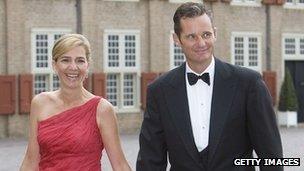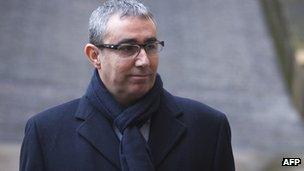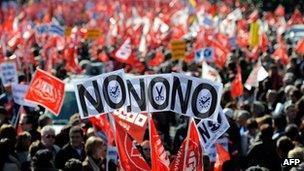Spanish duke's court case puts spotlight on royal family
- Published

The royal family is said to fear that Princess Cristina could be called to testify
Inaki Urdangarin, the husband of Spain's Princess Christina and son-in-law of King Juan Carlos, is to testify in court over allegations he misused millions of euros of public money.
He has not been formally charged but, as the BBC's Tom Burridge in Madrid explains, the case has brought a lot of unwelcome attention to Spain's royal family.
At 09:30 on Saturday, the son-in-law of Spain's King Juan Carlos is scheduled to appear in a court on the island of Mallorca.
Inaki Urdangarin will testify in a corruption scandal in which he is being investigated for allegedly embezzling millions of euros of public money.
The case involves two regional governments, several individuals and a total of 5.8m euros (£4.9m; $7.8m)of public money.
Mr Urdangarin, who also holds the title of Duke of Palma, ran a non-for-profit consultancy firm called Noos, with his business partner, Diego Torres.
In 2005 and 2006, Noos received 2.3m euros of public money from the regional government of the Balearic Islands, for organising sports and cultural events.
The allegation is that the price was hugely inflated and public money went missing or ended up in the accounts of private companies, linked to Mr Urdangarin and Mr Torres. The two men also signed contracts with the government of Valencia.
This week, Mr Urdangarin's lawyer said his client had made "administrative errors".
Public 'decided'
Neither of the two men has been charged with any offence, and both deny any wrongdoing.
Journalist Ana Romero has written extensively on the story for El Mundo, the Spanish newspaper that first started investigating the case in 2007.

Diego Torres, the duke's business partner. Both have denied any wrongdoing
In her opinion, people in Spain have already judged Mr Urdangarin through the detailed and almost daily coverage in the Spanish media.
"Unfortunately, even if Inaki Urdangarin is declared innocent by the court, the majority of Spaniards have already decided that he did use public funds to enrich himself and his family in a way he shouldn't have done," she said.
What the royal household is said to be most worried about is whether Mr Urdangarin's wife, Princess Cristina, will be called to give evidence in the case.
The princess was a co-owner of one of the companies being investigated.
A source with close links to the royal family, who has met Mr Urdangarin on several occasions, described a possible appearance by the princess in court as "unchartered territory".
King Juan Carlos made clear references to the case in his Christmas address, without mentioning it directly.
"Justice is the same for everybody," he said.
Early in the new year the royal household published for the first time details of the royals' earnings and expenses.
According to official figures, Spain's royal family costs the Spanish taxpayer between 8m and 10m euros a year. That is relatively cheap compared to most other European monarchies.

Soaring unemployment and labour reforms have angered the Spanish public
But unemployment in Spain has reached nearly one in four of the active working population and in this context the allegations look particularly bad.
The intense coverage of the case has changed the relationship between the Spanish media and the monarchy and, Ms Romero said, the royal family is being scrutinised in a way that has never happened before.
"It has been a very cosy relationship. Historically they have enjoyed a really nice treatment from the Spanish media, because of the role the king played during the transition to democracy."
King Juan Carlos's defining moment was his backing of Spain's then relatively new democratic government, during a failed military coup in 1981.
His support, which was crucial at the time, is one of the reasons why he remains largely popular in Spain.
However the scandal involving his son-in-law could have a detrimental affect on the Spanish royal family's popularity.
Even before many of the allegations against Inaki Urdangarin were reported in the Spanish media, an opinion poll carried out in October showed that the royal family's approval rating had dropped to 4.8 out of 10.
It was the first time the institution had scored less than five.
According to Ms Romero, Spain is a naturally Republican country. "We are monarchists in our head, and not in our heart," she said.
- Published29 December 2011
- Published28 December 2011
- Published27 January 2012
- Published27 January 2012